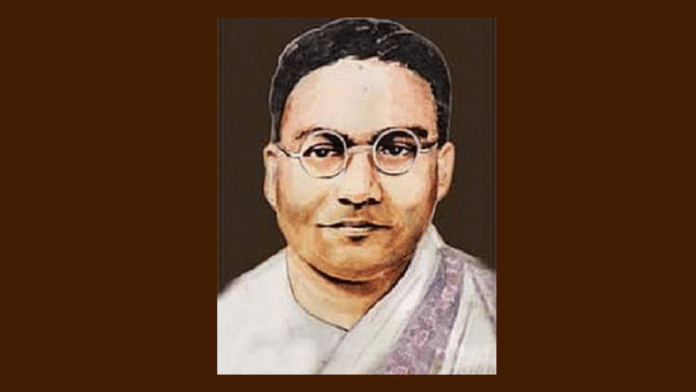On his 115th birth anniversary, ThePrint looks at the Dalit activist who traversed the distance to Pakistan, only to return back.
Dalit history, for most parts, remains an obscure subject. While B.R. Ambedkar and Jyotirao Phule are names known for efforts in bringing a caste reformation, the name of Jogendra Nath Mandal, who propelled Dalit and scheduled caste activism during India’s Independence, got lost somewhere.
Interestingly, he went on to become a minister in Pakistan, serving as the country’s first law minister as part of the Muhammad Ali Jinnah government.
Born on 29 January 1904 in the untouchable Namasudra community in erstwhile Bengal (now Bangladesh), he was exposed to the caste hierarchy early in life.
However, Mandal left behind such a legacy that half a century after his death, political parties still spar over his name.
On his 115th birth anniversary, ThePrint looks at the Dalit voice who traversed the distance to Pakistan, only to return back.
Indian politician
Mandal started his political career as a leader of the Scheduled Caste communities in Bengal. He was elected a member of the Bengal Legislative Assembly in 1937 from the Bakarganj North-East General Rural Constituency. Later, he held the posts of minister for Co-operative Credit and Rural Indebtedness.
Mandal also established the Bengal branch of All India Scheduled Castes Federation (AISCF). Ambedkar was its national leader.
Mandal also pushed for Ambedkar’s election to the Constituent Assembly.
In 1946, senior Congress leaders worked closely to not let Ambedkar win in the Bombay provincial assembly election. On Mandal’s insistence, Ambedkar contested from the Bengal province. Due to Mandal’s close association with the Muslim League and active participation of Dalits in the region, Ambedkar was elected to the Constituent Assembly.
Following his election, Ambedkar is believed to have written a detailed letter to Mandal.
Also read: How our Constitution makers debated & rejected the draconian sedition law
Minister in Pakistan
A nominated member of the Muslim League in the 1946 interim government, Mandal supported the idea of a United Bengal but Lord Mountbatten’s announcement of Partition on 3 June 1947 inclined him towards Pakistan. His support for the League stemmed from the belief that Dalit interest would be better protected in Jinnah’s ‘secular Pakistan’ than by Jawaharlal Nehru or Mahatma Gandhi in India.
The similarity of the socio-economic conditions of Dalits and Muslims further strengthened his belief.
After Partition, Mandal became a member of Pakistan’s Constituent Assembly in 1947. He later progressed to become the highest ranking Hindu member of the government by holding the post of Pakistan’s first law and labour minister.
When Jinnah was to be sworn in as the first Governor General of Pakistan, he is said to have asked Mandal to preside over the session. He held immense faith in Mandal for his vision and righteousness.
However, Mandal’s status as a minority leader did not last long in Pakistan with continuous suppression under a Muslim-majority bureaucracy. The situation worsened after Jinnah’s death in September 1948.
In March 1949, Mandal supported the controversial Objective Resolution which laid out several principles for Pakistan — like Allah’s sovereignty over the universe, principles of democracy, freedom, equality according to Islam, among others.
He later campaigned for a separate electorate for minorities like Dalits.
However, the growing hostility from Pakistan’s bureaucracy forced Mandal to migrate to India in 1950.
Also read: Damodar Swarup Seth, the socialist who felt Constituent Assembly didn’t represent all
Return to India
Upon Mandal’s return, India did not treat him kindly — he had become a political untouchable.
He continued his work, however, to rehabilitate Hindu refugees from Bangladesh who were fast filling up West Bengal.
He breathed his last on 5 October 1968 in Bangaon.







The print as expected reported half truth only…
This is a communist anti hindu mouthpiece only
Let me add why he returned to India
He went and supported Pakistan’s creation because he felt Dalits and muslims face same socio economic conditions and are suffering under Hindu majority…but when he went to Pakistan organsied riots were orchastrated against Hindus including Dalits….police and asldministrstion player significant role in targetting Hindus……men were killed, women were raped ..he raised the issue with Liaquat Ali Khan…an arrest warrant was issued against him…he had to run from.pakistan like a dog..
Later he came to.india to die in guilt alone…he fed innocent Dalits to muslims and himself returned back…
He wrote several articles on how muslims treat kaffirs…how they lay eyes on every non.muslim woman…forced conversion, kidnapping rape
…..muslims can not be brother of any non muslim….
Dear dalit hindu brothers and sisters, you are important upto their…….. Then you are kafir…..
Such a biased article. Why don’t you add the open resignation letter of mandal summoned to liyaqat ali khan.
Shame on you.
Exactly… only praise for him …. not throwing light on his ill doings